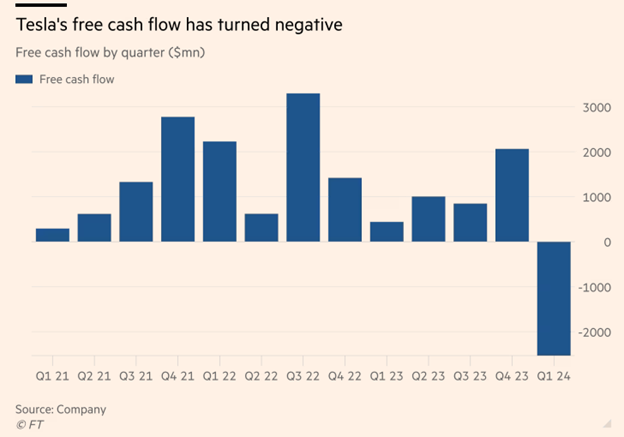Tesla, Inc. had a closely watched first quarter report, outlining poor results this week. But the markets’ initial reaction was positive, even if the financial results were underwhelming.
Why would the market push the stock 10 percent higher after disappointing results?
Tesla reported a 9 percent decline in revenue after a previously reported decline in the number of units sold. Profit was down 18 percent. But the results were not as bad as feared.
The market had expected a poor result, as slower deliveries for new vehicles were reported early in April. About 387,000 cars were delivered between January 1 and March 31, lower than the previous quarter, and notably even lower than a year ago. Inventories held by Tesla ballooned to 28 days, about double the normal inventory.
Tesla had announced previously that the company will be cutting about 10 percent of its 140,000 global workforce. This may not be as significant as it sounds because Tesla has been hiring people at a very fast pace for about a decade, and a shrinkage of that amount might just mean slowing the pace of hiring as people leave.
Tesla had been building a large cash balance and reducing its small amount of debt for several years, even as it built new factories and expanded existing facilities. So, it was a shock that free cash flow declined by $2.5 billion for the first time in several years.

But there is no reason to panic as Tesla still has net cash of $12.4 billion and a market capitalization of $500 billion. While lagging behind giants such as Apple ($2.6T) and Microsoft ($3.0T) in stock market valuation, Tesla is still one of the highest ranked companies.
Tesla made a gross profit margin of about 17.4 percent, higher than expected and slightly lower than prior periods of 19.3 percent. This is quite an impressive result as Tesla has cut prices quite aggressively in recent months on some models.
Musk reiterated the longstanding plan to offer an inexpensive car. This was welcome news, as recent musings hinted that autonomous driving has become more important than a cheaper auto. The market is understandably skeptical about a robo-taxi but believe that an affordable new model would sell really well.
When Musk stated that an affordable car would be the priority, the market reacted immediately. Lurking in the background is competition from China with electric vehicles priced below the cheapest cars currently offered.
Musk characterized this period as a pause between two major growth waves. The first phase was the Model 3/Y platform, and the new wave is vehicle autonomy.
Ride-hailing won’t come quickly enough to improve results in 2024. The promise of an affordable electric vehicle could be enough to reverse a slide in the stock price.
If investors worry that Musk is too focused on autonomy, they will not be reassured by this Musk statement: “If someone does not believe Tesla will solve autonomy, they should not be investing in this company.”
Hilliard MacBeth
The opinions expressed in this report are the opinions of the author and readers should not assume they reflect the opinions or recommendations of Richardson Wealth or its affiliates. Assumptions, opinions and estimates constitute the author's judgment as of the date of this material and are subject to change without notice. We do not warrant the completeness or accuracy of this material, and it should not be relied upon as such. Before acting on any recommendation, you should consider whether it is suitable for your particular circumstances and, if necessary, seek professional advice. Past performance is not indicative of future results. The comments contained herein are general in nature and are not intended to be, nor should be construed to be, legal or tax advice to any particular individual. Accordingly, individuals should consult their own legal or tax advisors for advice with respect to the tax consequences to them, having regard to their own particular circumstances.. Richardson Wealth is a member of Canadian Investor Protection Fund. Richardson Wealth is a trademark by its respective owners used under license by Richardson Wealth.